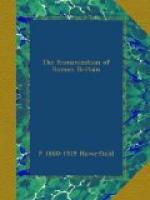[Footnote 1: The story of Vortigern and Hengist now first occurs and is obvious tradition or legend. A prince with a Celtic name may have ruled Kent in 450. There were, indeed, plenty of rulers with barbaric names in the fourth and fifth centuries of the Empire. But the tale cannot be called certain history.]
[Footnote 2: Thus, he refers to Silchester, and so good a judge as Stubbs once suggested that for this he had some authority now lost to us. Yet the mere fact that Geoffrey knows only the English name Silchester disproves this idea. Had he used a genuinely ancient authority, he would have (as elsewhere) employed the Roman name. Another explanation may be given. Geoffrey wrote in an antiquarian age, when the ruins of Roman towns were being noted. Both he and Henry of Huntingdon seem to have heard of the Silchester ruins, and both accordingly inserted the place into their pages.]
[Footnote 3: The English mediaeval chronicles have sometimes been supposed to preserve facts otherwise forgotten about Roman times. So far as I can judge, this is not the case, even with Henry of Huntingdon. Henry, in the later editions of his work, borrowed a few facts from Geoffrey of Monmouth, which are wanting in his first edition (see the All Souls MS.; the truth is obscured in the Rolls Series text). He also preserves one local tradition from Colchester: otherwise he contains nothing which need puzzle any inquirer. Giraldus Cambrensis, when at Rome, saw some manuscript which contained a list of the five provinces of fourth-century Britain—otherwise unknown throughout the Middle Ages (Archaeol. Oxoniensis, 1894, p. 224).]
But we are moving in a dim land of doubts and shadows. He who wanders here, wanders at his peril, for certainties are few, and that which at one moment seems a fact, is only too likely, as the quest advances, to prove a phantom. It is, too, a borderland, and its explorers need to know something of the regions on both sides of the frontier. I make no claim to that double knowledge. I have merely tried, using such evidence as I can, to sketch the character of one region, that of the Romano-British civilization.




